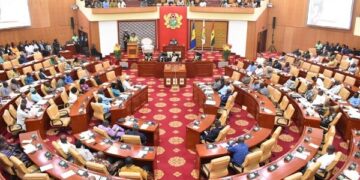The Bank of Ghana (BoG) has released its highly anticipated 2022 Annual Report, offering critical insights into the Government of Ghana’s debt landscape.
As of end-December 2022, the cumulative holdings of Ghana’s total debt stock by the BoG, 23 domestic banks, and select non-bank entities, including insurance companies, SSNIT, and rural banks, amounted to an impressive GHS 180.1 billion.
Notably, Ghana’s total debt stock stood at GHS 473 billion by the end of the specified period, with the domestic debt segment accounting for GHS 247.9 billion, a substantial portion of the nation’s overall financial commitments.
Delving into the report’s granularity, the Central Bank and the 23 domestic banks held a considerable share of GHS 103.6 billion in debt owed by the Government. This robust exposure reinforces their pivotal role in shaping the country’s financial landscape.
Furthermore, GHS 76.4 billion was owed to various non-bank institutions, including SSNIT, insurance companies, rural banks, and other finance entities, underscoring the diverse ecosystem of creditors supporting the Ghanaian economy.
In the international sphere, non-resident investors claimed a stake of GHS 13.8 billion, reflecting the nation’s openness to foreign investments and its engagement with global financial markets.
Meanwhile, the Government has imposed a 50% haircut on debts owed the Central Bank as it has written off half of the GHS 77.6 billion ($7 billion) it owed to the central bank and replaced the remainder with a lower yielding, 15-year bond.
The latest move is part of the West African nation’s push to restructure its domestic debt – a requirement to qualify for the next tranche of a $3 billion International Monetary Fund (IMF) rescue loan.
The comprehensive disclosure of Ghana’s debt holders is instrumental in understanding the nation’s fiscal dynamics and interactions with various economic sectors, both within its borders and on the international stage.
As the Government navigates its financial course, prudent debt management practices and collaboration with a diverse range of stakeholders remain essential in fostering sustainable economic growth and securing financial resilience.






















































































